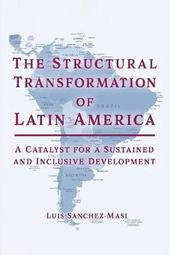
|
The Structural Transformation of Latin America: A Catalyst for a Sustained and Inclusive Development
Paperback / softback
Main Details
| Title |
The Structural Transformation of Latin America: A Catalyst for a Sustained and Inclusive Development
|
| Authors and Contributors |
By (author) Luis Sanchez-Masi
|
| Physical Properties |
| Format:Paperback / softback | | Pages:96 | | Dimensions(mm): Height 228,Width 152 |
|
| Category/Genre | Development economics |
|---|
| ISBN/Barcode |
9781667820392
|
| Audience | |
|---|
|
Publishing Details |
| Publisher |
BookBaby
|
| Imprint |
BookBaby
|
| Publication Date |
12 March 2022 |
| Publication Country |
United States
|
Description
Since the 1980s, the pace of Latin American economic growth has been erratic and notably lower than the world average. As a result, the region has been losing relative importance in the global context, as evidenced by abundant statistical information. Latin America's lag is multifaceted; it includes the economic, scientific, technological, social, and institutional fields. The productive structure of Latin American countries continues to be characterized by comparative advantages concentrated in primary sectors, as in past times, and its development dependent on the price and demand of primary products; the social marginalization endures and the income distribution in the region is the most unequal in the world; the technological divide with developed countries and with several Asian countries is ample and widening, and the socio-institutional environment persists as an important constraint to a sustained and inclusive development. The seriousness of this situation is aggravated by the fact that this is not a recent occurrence; four decades have already been lost. The current development model will only preserve this troubling reality; and yet, there is no perceived concern in the region about this situation; it would seem that there is a neglected conformism or ignorance about this Latin American reality. If this trend were to continue much longer, it could dangerously aggravate the frustration, mistrust, and skepticism of Latin Americans with their democratic regimes and institutions, symptoms of which have already surfaced. At present, Latin America faces a difficult crossroads: continue on the same path as in the last four decades, or conceive a new paradigm that could transform and modernize its productive structure and lead to a better future. This Essay examines the nature of the Latin American productive structure and outlines the conditions for its transformation in today's world. It identifies the most relevant circumstances that are hindering the development of Latin American countries by impeding their structural transformation. Finally, it postulates the framework for an eclectic development approach that combines government designed objectives and strategies with instruments and incentives typical of a market economy. The core of this eclectic paradigm is the transformation of the productive structure as the "catalyst agent" for a sustained and inclusive development. If Latin American countries do not succeed in transforming and modernizing their productive structure it will be difficult, if not impossible, to create the conditions for a sustained an inclusive development, as attested by the experience of the last four decades.
Author Biography
Luis Sanchez-Masi is an economist graduated from the Universidad Nacional Autonoma de Mexico (UNAM). He was an executive officer at the Inter-American Development Bank (IDB), with headquarters in Washington, D.C., and at CAF-Development Bank of Latin America, with headquarters in Caracas, Venezuela, institutions in which he held positions of high responsibility. His functions at IDB and CAF have put him in contact with the reality of Latin America and the Caribbean and have provided him with extensive experience in Latin American affairs. He is currently an independent researcher dedicated to the study of Latin American development issues. Luis Sanchez-Masi has authored books and articles on the development issues of Latin America and has lectured at universities and international forums.
|